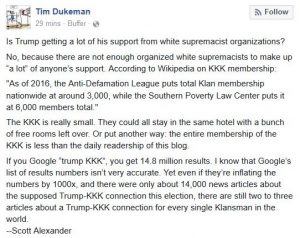It Doesn’t Matter Does It?
 After someone posted a meme in Facebook, one of his friends commented that it was obviously photoshopped. The original poster replied, “It doesn’t matter does it?”
After someone posted a meme in Facebook, one of his friends commented that it was obviously photoshopped. The original poster replied, “It doesn’t matter does it?”
I generally do not engage in such discussions, but I could not help but comment, “I think it matters a great deal if something is photoshopped and then passed on as a real image.” The original poster disagreed. As he responded, “The point the poster [creator of the meme] made was well made in my mind. I’m sure they were aware that it was a bit fixed.”
I was horrified. How is it possible for someone to justify falsifying evidence because the resulting meme agreed with his political point of view? And how could he describe using photoshop to make a substantive change as a mere fix? Yet, it happens all of the time.
Senator Daniel Patrick Moynihan once observed that “Everyone is entitled to his own opinion, but not to his own facts.” Yet, in arguing that it doesn’t matter that the image was photoshopped is equivalent to arguing that we can create our own facts.
As professors, it is important for us to help students realize that accuracy does make a difference; that falsifying information is intellectually—not just academically—dishonest. Furthermore, it is not possible to have an informed discussion if it is acceptable to create false evidence because the end results makes a good point. In such cases, “good point” is a euphemism for “the point agrees with my preconceived notions.”
 After President Trump was accused of getting “a lot” of support from white supremacist organizations, Scott Alexander wrote an analysis in which he argued against this proposition. To make his point, Alexander cited the number of individuals, which he places between 3,000 and 6,000, who are members of the Ku Klux Klan. Because so few Americans are KKK members, Alexander concludes that Trump’s accusers are incorrect in their claim that Trump is getting support from a lot of white supremacists.
After President Trump was accused of getting “a lot” of support from white supremacist organizations, Scott Alexander wrote an analysis in which he argued against this proposition. To make his point, Alexander cited the number of individuals, which he places between 3,000 and 6,000, who are members of the Ku Klux Klan. Because so few Americans are KKK members, Alexander concludes that Trump’s accusers are incorrect in their claim that Trump is getting support from a lot of white supremacists.
The problem with Alexander’s analysis is that while all members of the KKK are white supremacists, not all white supremacists are members of the KKK. For example, The Daily Stormer—who helped organize the recent protests in Charlottesville, Virginia—claimed a daily readership of 120,000. Stormfront, another prominent white supremacist group claimed 300,000 members as of 2015.
After adding up the total number of individuals who are members of white supremacist organizations while correcting for the number of individuals who might be involved in more than one such organization, we can debate whether or not President Trump is getting “a lot” of support from white supremacists. But Alexander’s statistics are grossly inaccurate and his logical error is appalling. But what is even more appalling is that this analysis popped up on my Facebook timeline because it was liked by a university professor.
Unfortunately, the attitude of “It doesn’t matter does it?” is not limited to one political ideology. In fact, I take an even dimmer view of liberals who use sloppy logic and manipulated data than I do of the conservative whose comment served as the inspiration for this essay. I would like to think that those of us who identify as liberals or progressives are better than that. Yet, too many of us are not. And such errors of logic can be found among other political groups as well.
As faculty members we need take a stand against the notion that “It doesn’t matter does it?” by helping students develop the critical thinking skills necessary to understand that a “good point” is good not necessary because we agree with it.
- –Steven L. Berg, PhD
LEAVE A COMMENT